Marxist Analysis of 'Reunion' and 'Sailing to Byzantium' Literature
VerifiedAdded on 2023/01/03
|9
|2957
|38
Essay
AI Summary
This essay undertakes a Marxist analysis of William Butler Yeats' poem "Sailing to Byzantium" and John Cheever's short story "Reunion," exploring their interconnected themes. The analysis examines the concepts of immortality, art, human spirit, disappointment, connection, identity, separation, alcoholism, and regret within the context of Marxist theory. The essay investigates how these themes are presented and interpreted through a Marxist lens, drawing comparisons and contrasts between the poem and the short story. It highlights the societal and personal factors influencing the characters' actions, and the similarities and differences in the settings and purposes of the narratives. The essay concludes by offering a comprehensive understanding of the two literary works based on the Marxist perspective.
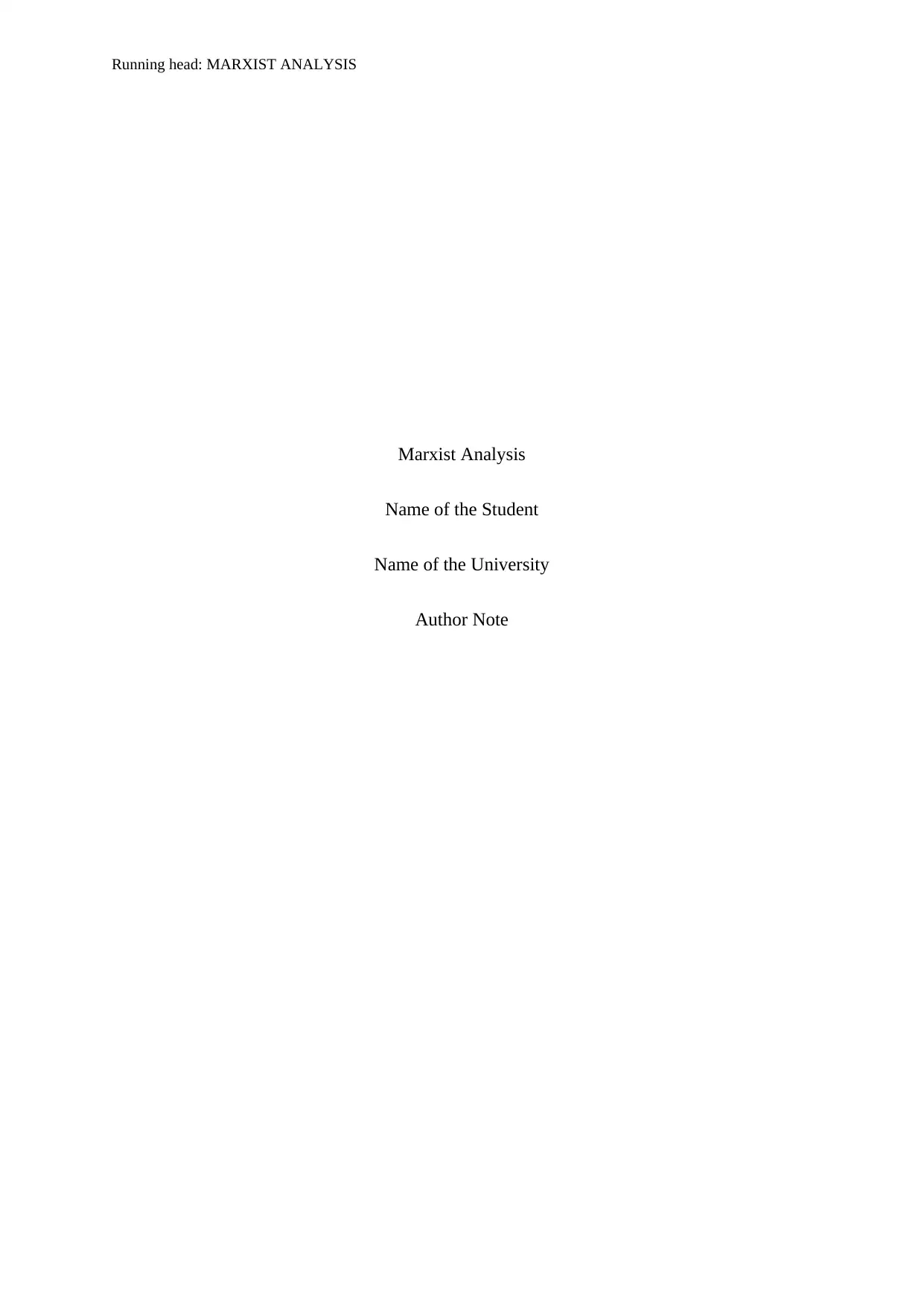
Running head: MARXIST ANALYSIS
Marxist Analysis
Name of the Student
Name of the University
Author Note
Marxist Analysis
Name of the Student
Name of the University
Author Note
Paraphrase This Document
Need a fresh take? Get an instant paraphrase of this document with our AI Paraphraser
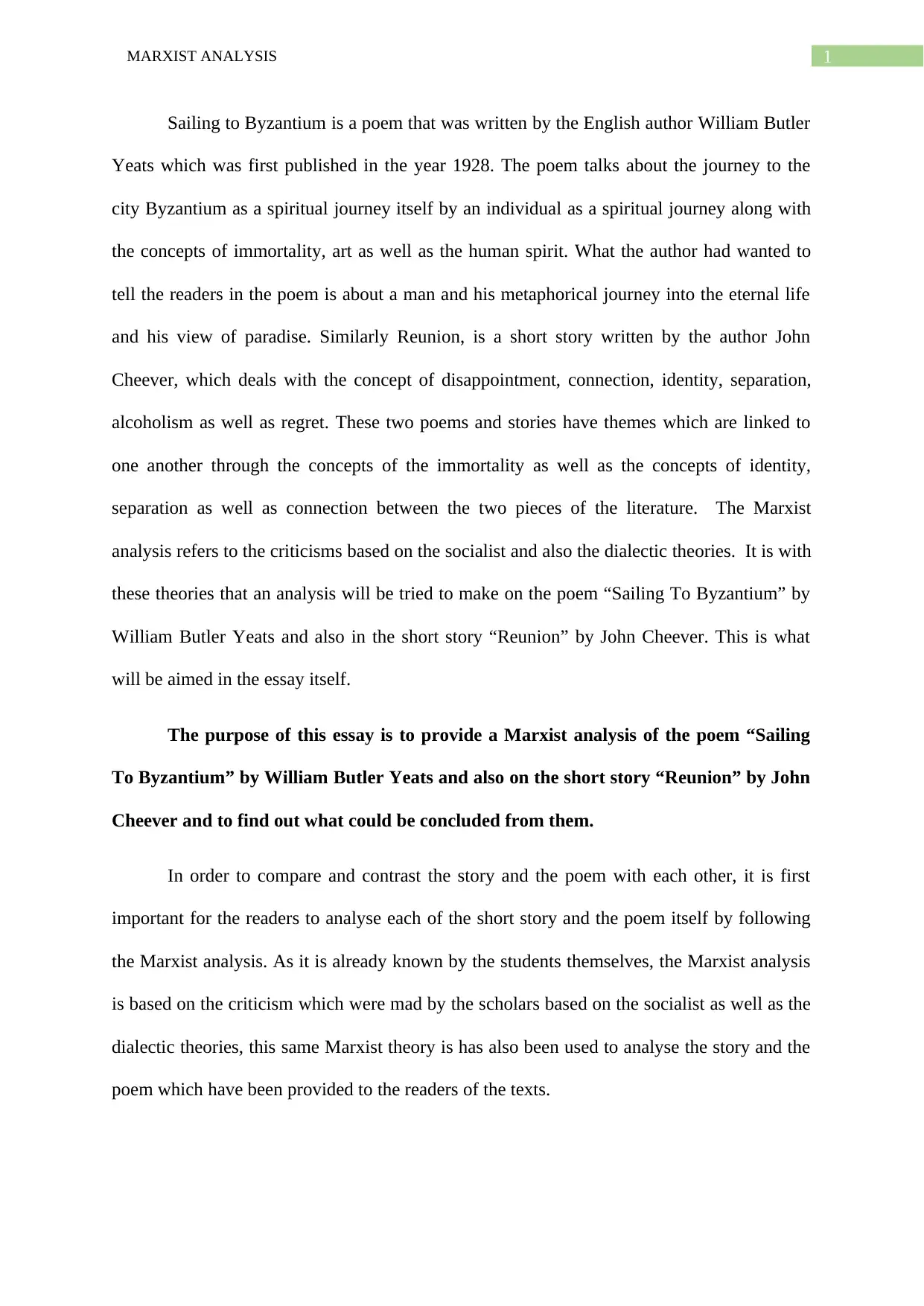
1MARXIST ANALYSIS
Sailing to Byzantium is a poem that was written by the English author William Butler
Yeats which was first published in the year 1928. The poem talks about the journey to the
city Byzantium as a spiritual journey itself by an individual as a spiritual journey along with
the concepts of immortality, art as well as the human spirit. What the author had wanted to
tell the readers in the poem is about a man and his metaphorical journey into the eternal life
and his view of paradise. Similarly Reunion, is a short story written by the author John
Cheever, which deals with the concept of disappointment, connection, identity, separation,
alcoholism as well as regret. These two poems and stories have themes which are linked to
one another through the concepts of the immortality as well as the concepts of identity,
separation as well as connection between the two pieces of the literature. The Marxist
analysis refers to the criticisms based on the socialist and also the dialectic theories. It is with
these theories that an analysis will be tried to make on the poem “Sailing To Byzantium” by
William Butler Yeats and also in the short story “Reunion” by John Cheever. This is what
will be aimed in the essay itself.
The purpose of this essay is to provide a Marxist analysis of the poem “Sailing
To Byzantium” by William Butler Yeats and also on the short story “Reunion” by John
Cheever and to find out what could be concluded from them.
In order to compare and contrast the story and the poem with each other, it is first
important for the readers to analyse each of the short story and the poem itself by following
the Marxist analysis. As it is already known by the students themselves, the Marxist analysis
is based on the criticism which were mad by the scholars based on the socialist as well as the
dialectic theories, this same Marxist theory is has also been used to analyse the story and the
poem which have been provided to the readers of the texts.
Sailing to Byzantium is a poem that was written by the English author William Butler
Yeats which was first published in the year 1928. The poem talks about the journey to the
city Byzantium as a spiritual journey itself by an individual as a spiritual journey along with
the concepts of immortality, art as well as the human spirit. What the author had wanted to
tell the readers in the poem is about a man and his metaphorical journey into the eternal life
and his view of paradise. Similarly Reunion, is a short story written by the author John
Cheever, which deals with the concept of disappointment, connection, identity, separation,
alcoholism as well as regret. These two poems and stories have themes which are linked to
one another through the concepts of the immortality as well as the concepts of identity,
separation as well as connection between the two pieces of the literature. The Marxist
analysis refers to the criticisms based on the socialist and also the dialectic theories. It is with
these theories that an analysis will be tried to make on the poem “Sailing To Byzantium” by
William Butler Yeats and also in the short story “Reunion” by John Cheever. This is what
will be aimed in the essay itself.
The purpose of this essay is to provide a Marxist analysis of the poem “Sailing
To Byzantium” by William Butler Yeats and also on the short story “Reunion” by John
Cheever and to find out what could be concluded from them.
In order to compare and contrast the story and the poem with each other, it is first
important for the readers to analyse each of the short story and the poem itself by following
the Marxist analysis. As it is already known by the students themselves, the Marxist analysis
is based on the criticism which were mad by the scholars based on the socialist as well as the
dialectic theories, this same Marxist theory is has also been used to analyse the story and the
poem which have been provided to the readers of the texts.
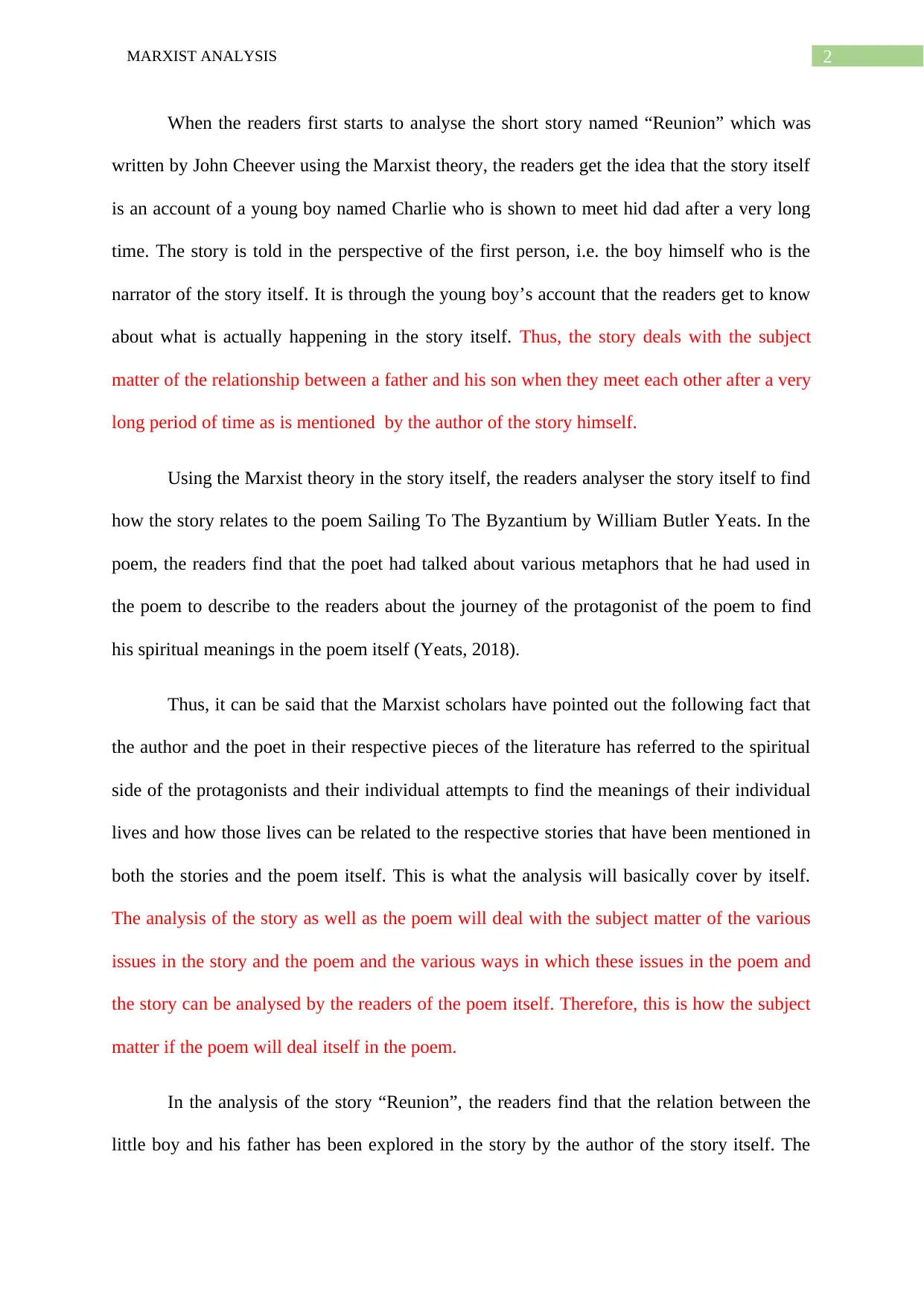
2MARXIST ANALYSIS
When the readers first starts to analyse the short story named “Reunion” which was
written by John Cheever using the Marxist theory, the readers get the idea that the story itself
is an account of a young boy named Charlie who is shown to meet hid dad after a very long
time. The story is told in the perspective of the first person, i.e. the boy himself who is the
narrator of the story itself. It is through the young boy’s account that the readers get to know
about what is actually happening in the story itself. Thus, the story deals with the subject
matter of the relationship between a father and his son when they meet each other after a very
long period of time as is mentioned by the author of the story himself.
Using the Marxist theory in the story itself, the readers analyser the story itself to find
how the story relates to the poem Sailing To The Byzantium by William Butler Yeats. In the
poem, the readers find that the poet had talked about various metaphors that he had used in
the poem to describe to the readers about the journey of the protagonist of the poem to find
his spiritual meanings in the poem itself (Yeats, 2018).
Thus, it can be said that the Marxist scholars have pointed out the following fact that
the author and the poet in their respective pieces of the literature has referred to the spiritual
side of the protagonists and their individual attempts to find the meanings of their individual
lives and how those lives can be related to the respective stories that have been mentioned in
both the stories and the poem itself. This is what the analysis will basically cover by itself.
The analysis of the story as well as the poem will deal with the subject matter of the various
issues in the story and the poem and the various ways in which these issues in the poem and
the story can be analysed by the readers of the poem itself. Therefore, this is how the subject
matter if the poem will deal itself in the poem.
In the analysis of the story “Reunion”, the readers find that the relation between the
little boy and his father has been explored in the story by the author of the story itself. The
When the readers first starts to analyse the short story named “Reunion” which was
written by John Cheever using the Marxist theory, the readers get the idea that the story itself
is an account of a young boy named Charlie who is shown to meet hid dad after a very long
time. The story is told in the perspective of the first person, i.e. the boy himself who is the
narrator of the story itself. It is through the young boy’s account that the readers get to know
about what is actually happening in the story itself. Thus, the story deals with the subject
matter of the relationship between a father and his son when they meet each other after a very
long period of time as is mentioned by the author of the story himself.
Using the Marxist theory in the story itself, the readers analyser the story itself to find
how the story relates to the poem Sailing To The Byzantium by William Butler Yeats. In the
poem, the readers find that the poet had talked about various metaphors that he had used in
the poem to describe to the readers about the journey of the protagonist of the poem to find
his spiritual meanings in the poem itself (Yeats, 2018).
Thus, it can be said that the Marxist scholars have pointed out the following fact that
the author and the poet in their respective pieces of the literature has referred to the spiritual
side of the protagonists and their individual attempts to find the meanings of their individual
lives and how those lives can be related to the respective stories that have been mentioned in
both the stories and the poem itself. This is what the analysis will basically cover by itself.
The analysis of the story as well as the poem will deal with the subject matter of the various
issues in the story and the poem and the various ways in which these issues in the poem and
the story can be analysed by the readers of the poem itself. Therefore, this is how the subject
matter if the poem will deal itself in the poem.
In the analysis of the story “Reunion”, the readers find that the relation between the
little boy and his father has been explored in the story by the author of the story itself. The
⊘ This is a preview!⊘
Do you want full access?
Subscribe today to unlock all pages.

Trusted by 1+ million students worldwide
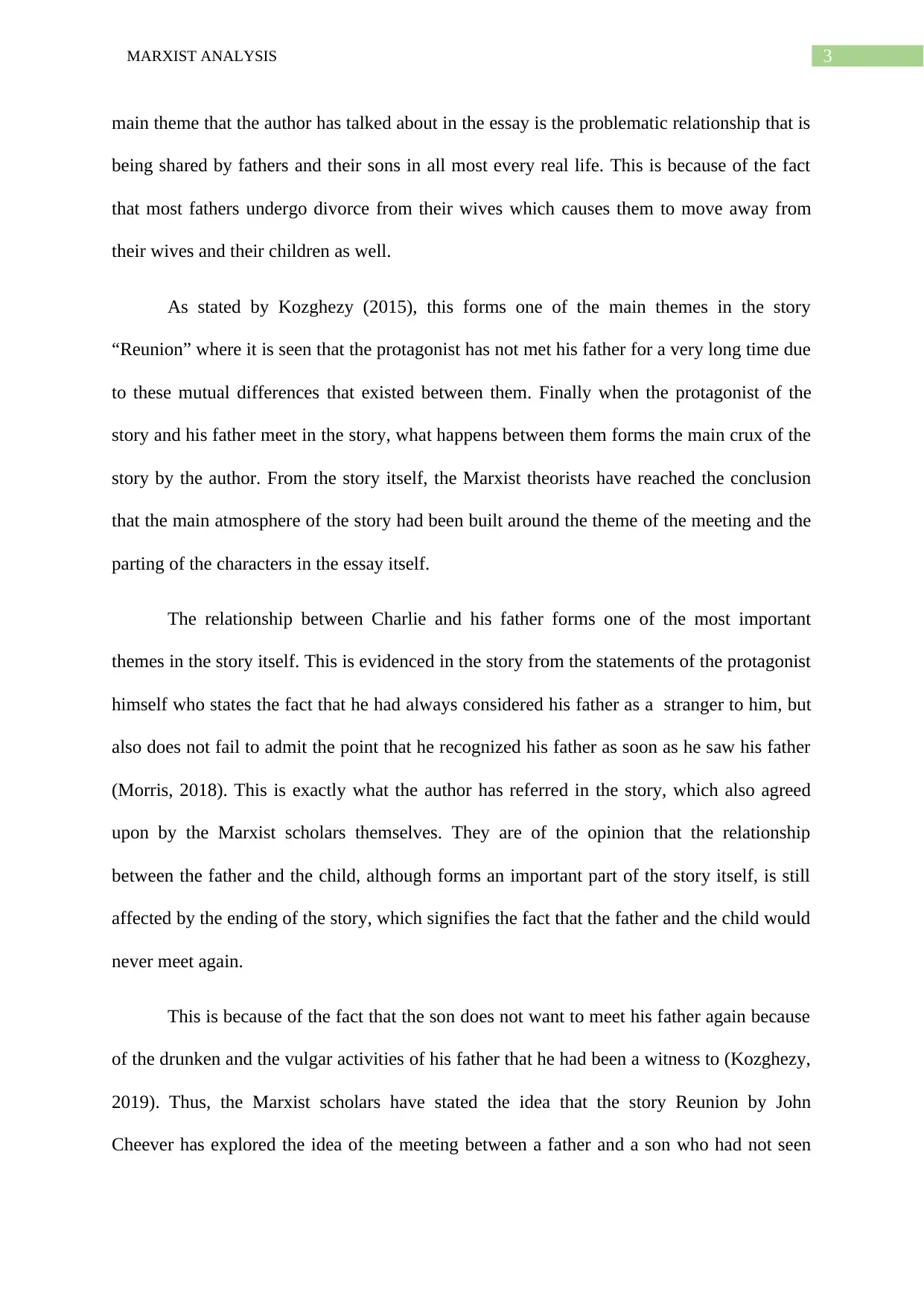
3MARXIST ANALYSIS
main theme that the author has talked about in the essay is the problematic relationship that is
being shared by fathers and their sons in all most every real life. This is because of the fact
that most fathers undergo divorce from their wives which causes them to move away from
their wives and their children as well.
As stated by Kozghezy (2015), this forms one of the main themes in the story
“Reunion” where it is seen that the protagonist has not met his father for a very long time due
to these mutual differences that existed between them. Finally when the protagonist of the
story and his father meet in the story, what happens between them forms the main crux of the
story by the author. From the story itself, the Marxist theorists have reached the conclusion
that the main atmosphere of the story had been built around the theme of the meeting and the
parting of the characters in the essay itself.
The relationship between Charlie and his father forms one of the most important
themes in the story itself. This is evidenced in the story from the statements of the protagonist
himself who states the fact that he had always considered his father as a stranger to him, but
also does not fail to admit the point that he recognized his father as soon as he saw his father
(Morris, 2018). This is exactly what the author has referred in the story, which also agreed
upon by the Marxist scholars themselves. They are of the opinion that the relationship
between the father and the child, although forms an important part of the story itself, is still
affected by the ending of the story, which signifies the fact that the father and the child would
never meet again.
This is because of the fact that the son does not want to meet his father again because
of the drunken and the vulgar activities of his father that he had been a witness to (Kozghezy,
2019). Thus, the Marxist scholars have stated the idea that the story Reunion by John
Cheever has explored the idea of the meeting between a father and a son who had not seen
main theme that the author has talked about in the essay is the problematic relationship that is
being shared by fathers and their sons in all most every real life. This is because of the fact
that most fathers undergo divorce from their wives which causes them to move away from
their wives and their children as well.
As stated by Kozghezy (2015), this forms one of the main themes in the story
“Reunion” where it is seen that the protagonist has not met his father for a very long time due
to these mutual differences that existed between them. Finally when the protagonist of the
story and his father meet in the story, what happens between them forms the main crux of the
story by the author. From the story itself, the Marxist theorists have reached the conclusion
that the main atmosphere of the story had been built around the theme of the meeting and the
parting of the characters in the essay itself.
The relationship between Charlie and his father forms one of the most important
themes in the story itself. This is evidenced in the story from the statements of the protagonist
himself who states the fact that he had always considered his father as a stranger to him, but
also does not fail to admit the point that he recognized his father as soon as he saw his father
(Morris, 2018). This is exactly what the author has referred in the story, which also agreed
upon by the Marxist scholars themselves. They are of the opinion that the relationship
between the father and the child, although forms an important part of the story itself, is still
affected by the ending of the story, which signifies the fact that the father and the child would
never meet again.
This is because of the fact that the son does not want to meet his father again because
of the drunken and the vulgar activities of his father that he had been a witness to (Kozghezy,
2019). Thus, the Marxist scholars have stated the idea that the story Reunion by John
Cheever has explored the idea of the meeting between a father and a son who had not seen
Paraphrase This Document
Need a fresh take? Get an instant paraphrase of this document with our AI Paraphraser
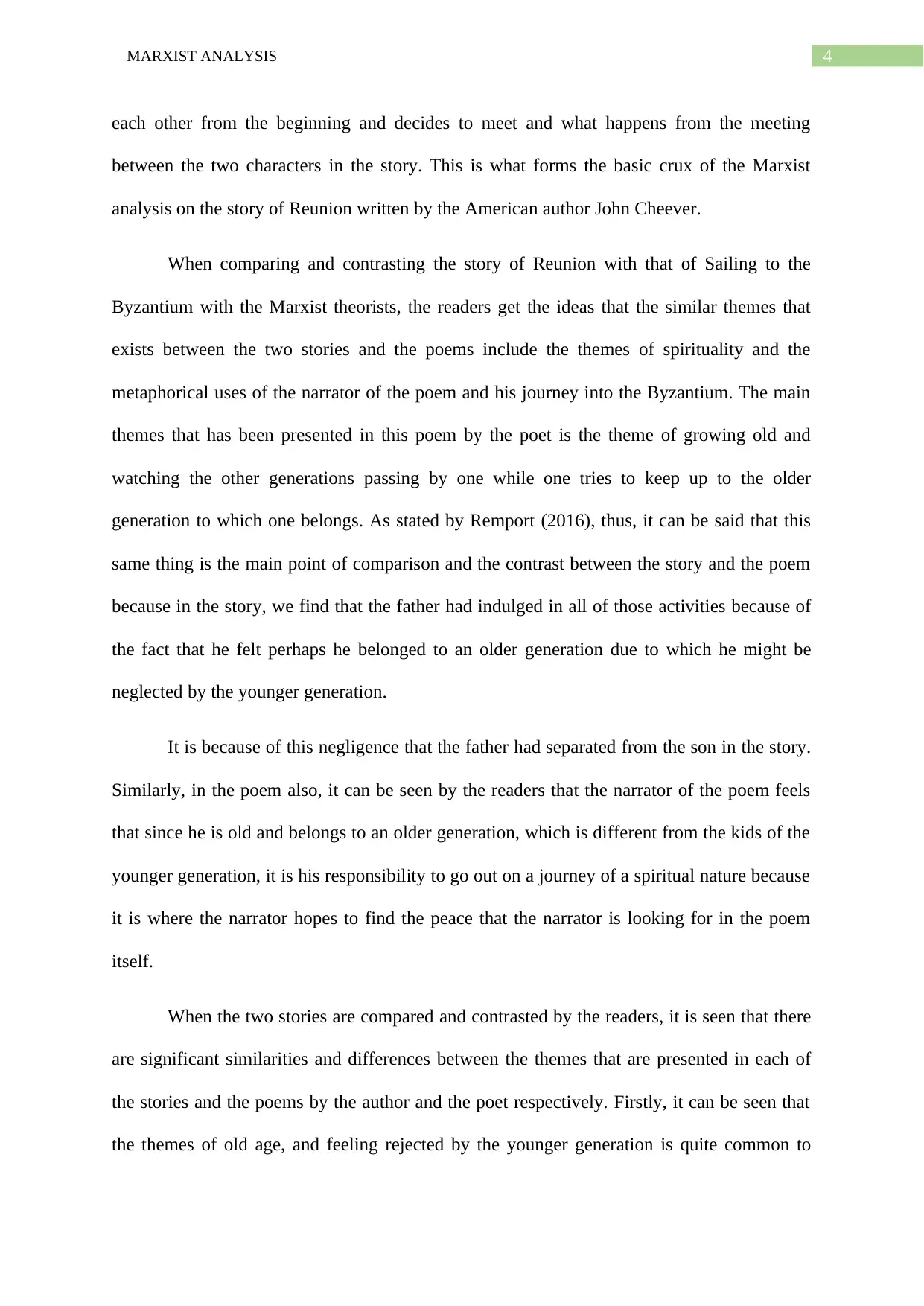
4MARXIST ANALYSIS
each other from the beginning and decides to meet and what happens from the meeting
between the two characters in the story. This is what forms the basic crux of the Marxist
analysis on the story of Reunion written by the American author John Cheever.
When comparing and contrasting the story of Reunion with that of Sailing to the
Byzantium with the Marxist theorists, the readers get the ideas that the similar themes that
exists between the two stories and the poems include the themes of spirituality and the
metaphorical uses of the narrator of the poem and his journey into the Byzantium. The main
themes that has been presented in this poem by the poet is the theme of growing old and
watching the other generations passing by one while one tries to keep up to the older
generation to which one belongs. As stated by Remport (2016), thus, it can be said that this
same thing is the main point of comparison and the contrast between the story and the poem
because in the story, we find that the father had indulged in all of those activities because of
the fact that he felt perhaps he belonged to an older generation due to which he might be
neglected by the younger generation.
It is because of this negligence that the father had separated from the son in the story.
Similarly, in the poem also, it can be seen by the readers that the narrator of the poem feels
that since he is old and belongs to an older generation, which is different from the kids of the
younger generation, it is his responsibility to go out on a journey of a spiritual nature because
it is where the narrator hopes to find the peace that the narrator is looking for in the poem
itself.
When the two stories are compared and contrasted by the readers, it is seen that there
are significant similarities and differences between the themes that are presented in each of
the stories and the poems by the author and the poet respectively. Firstly, it can be seen that
the themes of old age, and feeling rejected by the younger generation is quite common to
each other from the beginning and decides to meet and what happens from the meeting
between the two characters in the story. This is what forms the basic crux of the Marxist
analysis on the story of Reunion written by the American author John Cheever.
When comparing and contrasting the story of Reunion with that of Sailing to the
Byzantium with the Marxist theorists, the readers get the ideas that the similar themes that
exists between the two stories and the poems include the themes of spirituality and the
metaphorical uses of the narrator of the poem and his journey into the Byzantium. The main
themes that has been presented in this poem by the poet is the theme of growing old and
watching the other generations passing by one while one tries to keep up to the older
generation to which one belongs. As stated by Remport (2016), thus, it can be said that this
same thing is the main point of comparison and the contrast between the story and the poem
because in the story, we find that the father had indulged in all of those activities because of
the fact that he felt perhaps he belonged to an older generation due to which he might be
neglected by the younger generation.
It is because of this negligence that the father had separated from the son in the story.
Similarly, in the poem also, it can be seen by the readers that the narrator of the poem feels
that since he is old and belongs to an older generation, which is different from the kids of the
younger generation, it is his responsibility to go out on a journey of a spiritual nature because
it is where the narrator hopes to find the peace that the narrator is looking for in the poem
itself.
When the two stories are compared and contrasted by the readers, it is seen that there
are significant similarities and differences between the themes that are presented in each of
the stories and the poems by the author and the poet respectively. Firstly, it can be seen that
the themes of old age, and feeling rejected by the younger generation is quite common to
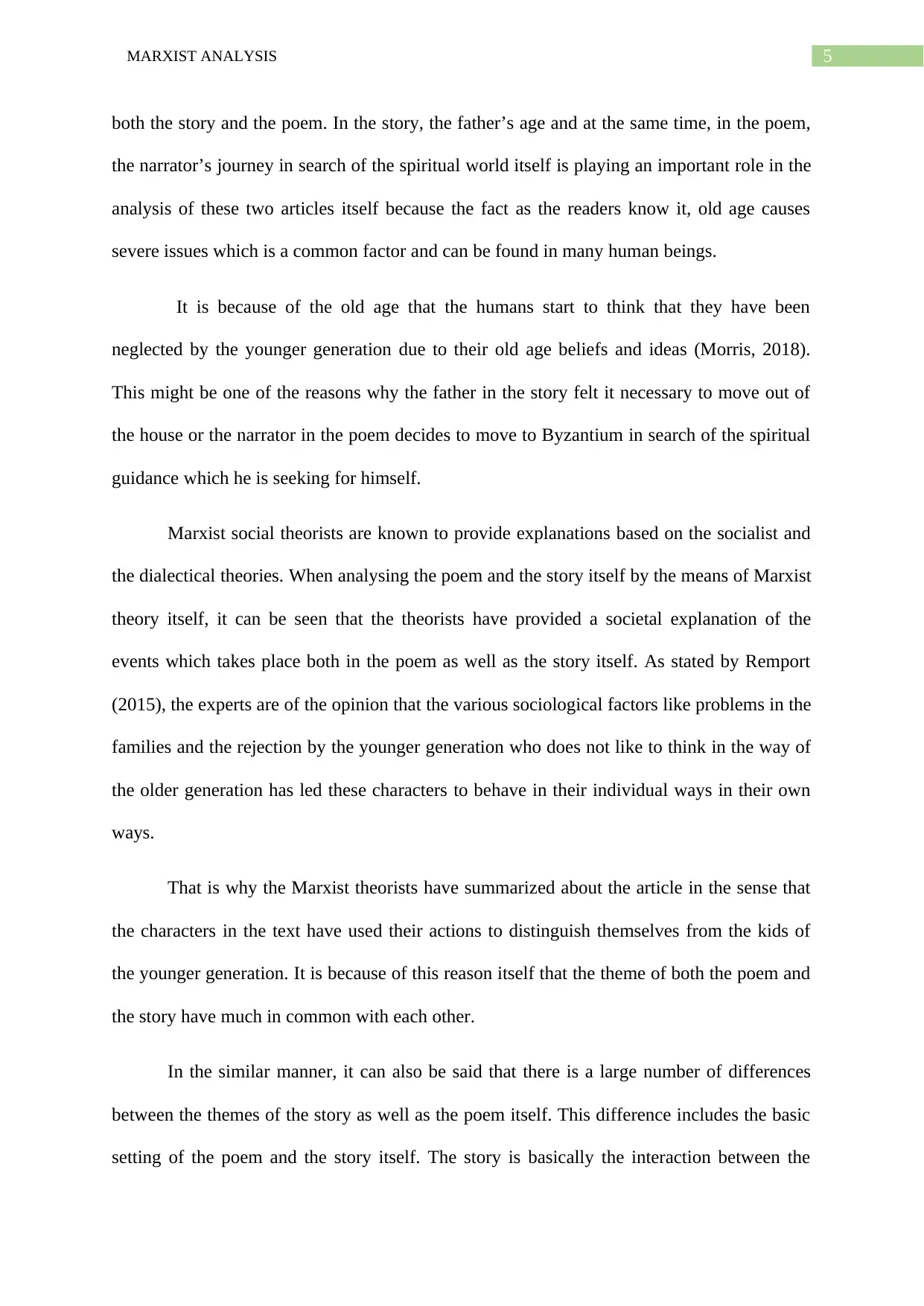
5MARXIST ANALYSIS
both the story and the poem. In the story, the father’s age and at the same time, in the poem,
the narrator’s journey in search of the spiritual world itself is playing an important role in the
analysis of these two articles itself because the fact as the readers know it, old age causes
severe issues which is a common factor and can be found in many human beings.
It is because of the old age that the humans start to think that they have been
neglected by the younger generation due to their old age beliefs and ideas (Morris, 2018).
This might be one of the reasons why the father in the story felt it necessary to move out of
the house or the narrator in the poem decides to move to Byzantium in search of the spiritual
guidance which he is seeking for himself.
Marxist social theorists are known to provide explanations based on the socialist and
the dialectical theories. When analysing the poem and the story itself by the means of Marxist
theory itself, it can be seen that the theorists have provided a societal explanation of the
events which takes place both in the poem as well as the story itself. As stated by Remport
(2015), the experts are of the opinion that the various sociological factors like problems in the
families and the rejection by the younger generation who does not like to think in the way of
the older generation has led these characters to behave in their individual ways in their own
ways.
That is why the Marxist theorists have summarized about the article in the sense that
the characters in the text have used their actions to distinguish themselves from the kids of
the younger generation. It is because of this reason itself that the theme of both the poem and
the story have much in common with each other.
In the similar manner, it can also be said that there is a large number of differences
between the themes of the story as well as the poem itself. This difference includes the basic
setting of the poem and the story itself. The story is basically the interaction between the
both the story and the poem. In the story, the father’s age and at the same time, in the poem,
the narrator’s journey in search of the spiritual world itself is playing an important role in the
analysis of these two articles itself because the fact as the readers know it, old age causes
severe issues which is a common factor and can be found in many human beings.
It is because of the old age that the humans start to think that they have been
neglected by the younger generation due to their old age beliefs and ideas (Morris, 2018).
This might be one of the reasons why the father in the story felt it necessary to move out of
the house or the narrator in the poem decides to move to Byzantium in search of the spiritual
guidance which he is seeking for himself.
Marxist social theorists are known to provide explanations based on the socialist and
the dialectical theories. When analysing the poem and the story itself by the means of Marxist
theory itself, it can be seen that the theorists have provided a societal explanation of the
events which takes place both in the poem as well as the story itself. As stated by Remport
(2015), the experts are of the opinion that the various sociological factors like problems in the
families and the rejection by the younger generation who does not like to think in the way of
the older generation has led these characters to behave in their individual ways in their own
ways.
That is why the Marxist theorists have summarized about the article in the sense that
the characters in the text have used their actions to distinguish themselves from the kids of
the younger generation. It is because of this reason itself that the theme of both the poem and
the story have much in common with each other.
In the similar manner, it can also be said that there is a large number of differences
between the themes of the story as well as the poem itself. This difference includes the basic
setting of the poem and the story itself. The story is basically the interaction between the
⊘ This is a preview!⊘
Do you want full access?
Subscribe today to unlock all pages.

Trusted by 1+ million students worldwide
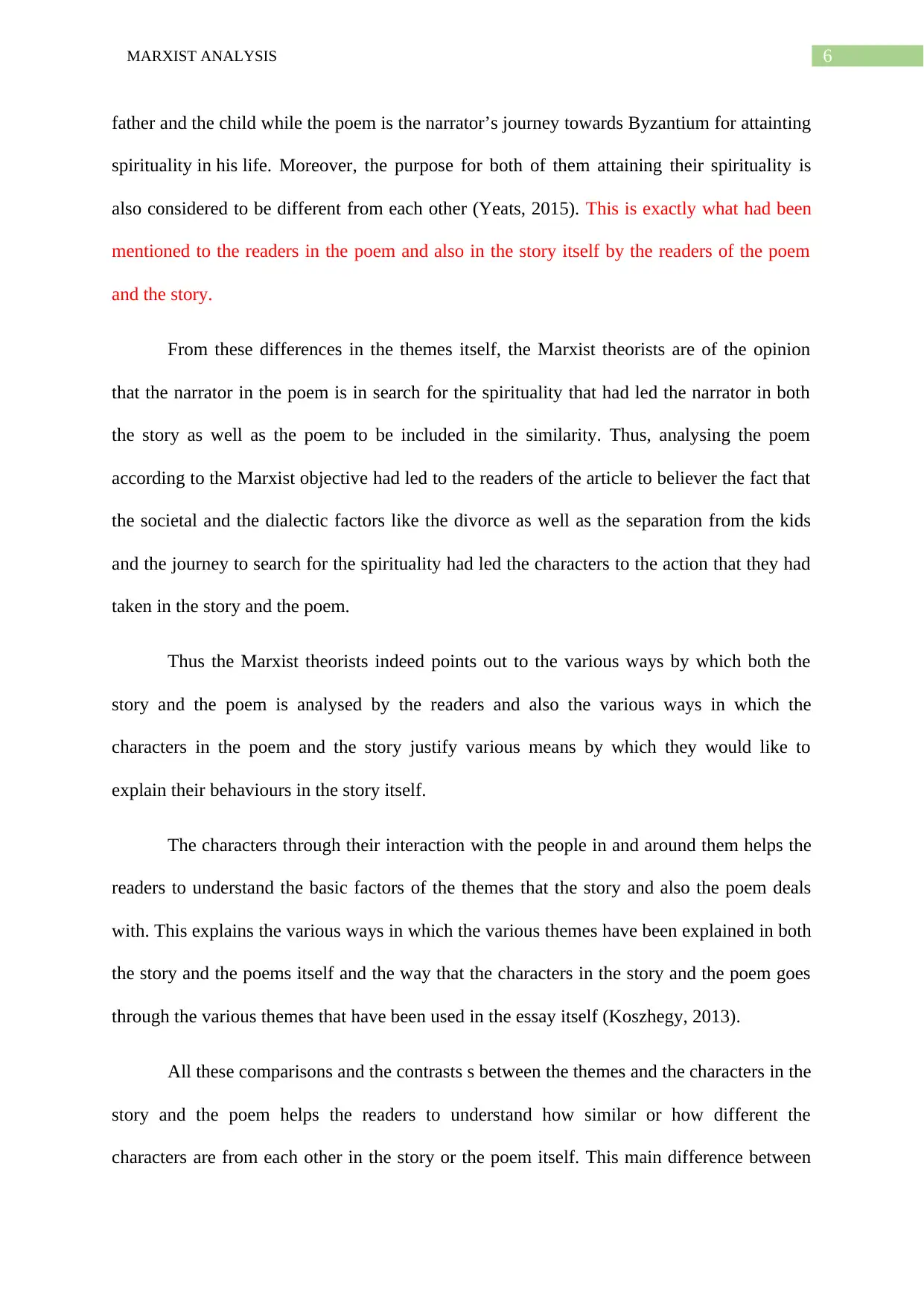
6MARXIST ANALYSIS
father and the child while the poem is the narrator’s journey towards Byzantium for attainting
spirituality in his life. Moreover, the purpose for both of them attaining their spirituality is
also considered to be different from each other (Yeats, 2015). This is exactly what had been
mentioned to the readers in the poem and also in the story itself by the readers of the poem
and the story.
From these differences in the themes itself, the Marxist theorists are of the opinion
that the narrator in the poem is in search for the spirituality that had led the narrator in both
the story as well as the poem to be included in the similarity. Thus, analysing the poem
according to the Marxist objective had led to the readers of the article to believer the fact that
the societal and the dialectic factors like the divorce as well as the separation from the kids
and the journey to search for the spirituality had led the characters to the action that they had
taken in the story and the poem.
Thus the Marxist theorists indeed points out to the various ways by which both the
story and the poem is analysed by the readers and also the various ways in which the
characters in the poem and the story justify various means by which they would like to
explain their behaviours in the story itself.
The characters through their interaction with the people in and around them helps the
readers to understand the basic factors of the themes that the story and also the poem deals
with. This explains the various ways in which the various themes have been explained in both
the story and the poems itself and the way that the characters in the story and the poem goes
through the various themes that have been used in the essay itself (Koszhegy, 2013).
All these comparisons and the contrasts s between the themes and the characters in the
story and the poem helps the readers to understand how similar or how different the
characters are from each other in the story or the poem itself. This main difference between
father and the child while the poem is the narrator’s journey towards Byzantium for attainting
spirituality in his life. Moreover, the purpose for both of them attaining their spirituality is
also considered to be different from each other (Yeats, 2015). This is exactly what had been
mentioned to the readers in the poem and also in the story itself by the readers of the poem
and the story.
From these differences in the themes itself, the Marxist theorists are of the opinion
that the narrator in the poem is in search for the spirituality that had led the narrator in both
the story as well as the poem to be included in the similarity. Thus, analysing the poem
according to the Marxist objective had led to the readers of the article to believer the fact that
the societal and the dialectic factors like the divorce as well as the separation from the kids
and the journey to search for the spirituality had led the characters to the action that they had
taken in the story and the poem.
Thus the Marxist theorists indeed points out to the various ways by which both the
story and the poem is analysed by the readers and also the various ways in which the
characters in the poem and the story justify various means by which they would like to
explain their behaviours in the story itself.
The characters through their interaction with the people in and around them helps the
readers to understand the basic factors of the themes that the story and also the poem deals
with. This explains the various ways in which the various themes have been explained in both
the story and the poems itself and the way that the characters in the story and the poem goes
through the various themes that have been used in the essay itself (Koszhegy, 2013).
All these comparisons and the contrasts s between the themes and the characters in the
story and the poem helps the readers to understand how similar or how different the
characters are from each other in the story or the poem itself. This main difference between
Paraphrase This Document
Need a fresh take? Get an instant paraphrase of this document with our AI Paraphraser
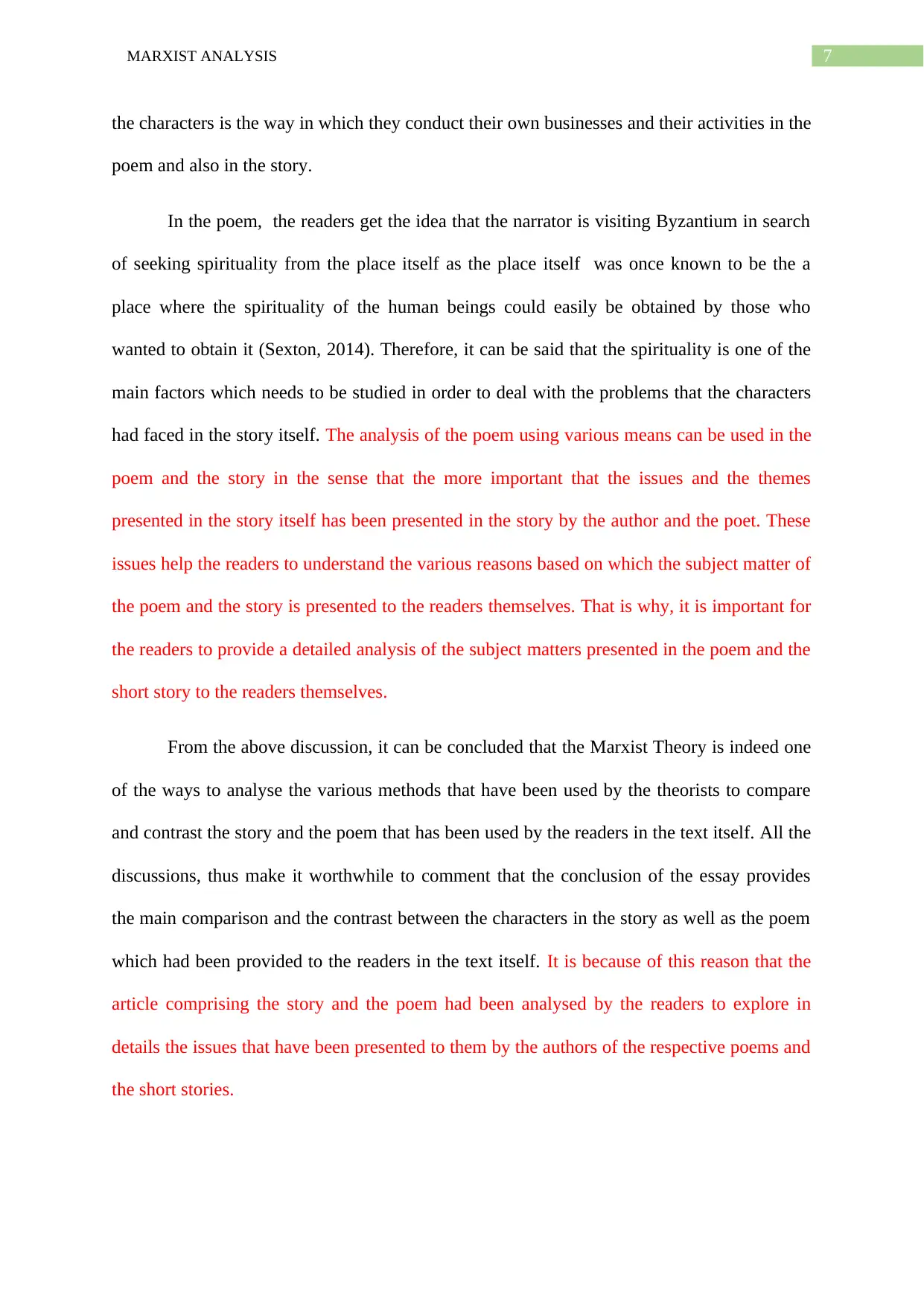
7MARXIST ANALYSIS
the characters is the way in which they conduct their own businesses and their activities in the
poem and also in the story.
In the poem, the readers get the idea that the narrator is visiting Byzantium in search
of seeking spirituality from the place itself as the place itself was once known to be the a
place where the spirituality of the human beings could easily be obtained by those who
wanted to obtain it (Sexton, 2014). Therefore, it can be said that the spirituality is one of the
main factors which needs to be studied in order to deal with the problems that the characters
had faced in the story itself. The analysis of the poem using various means can be used in the
poem and the story in the sense that the more important that the issues and the themes
presented in the story itself has been presented in the story by the author and the poet. These
issues help the readers to understand the various reasons based on which the subject matter of
the poem and the story is presented to the readers themselves. That is why, it is important for
the readers to provide a detailed analysis of the subject matters presented in the poem and the
short story to the readers themselves.
From the above discussion, it can be concluded that the Marxist Theory is indeed one
of the ways to analyse the various methods that have been used by the theorists to compare
and contrast the story and the poem that has been used by the readers in the text itself. All the
discussions, thus make it worthwhile to comment that the conclusion of the essay provides
the main comparison and the contrast between the characters in the story as well as the poem
which had been provided to the readers in the text itself. It is because of this reason that the
article comprising the story and the poem had been analysed by the readers to explore in
details the issues that have been presented to them by the authors of the respective poems and
the short stories.
the characters is the way in which they conduct their own businesses and their activities in the
poem and also in the story.
In the poem, the readers get the idea that the narrator is visiting Byzantium in search
of seeking spirituality from the place itself as the place itself was once known to be the a
place where the spirituality of the human beings could easily be obtained by those who
wanted to obtain it (Sexton, 2014). Therefore, it can be said that the spirituality is one of the
main factors which needs to be studied in order to deal with the problems that the characters
had faced in the story itself. The analysis of the poem using various means can be used in the
poem and the story in the sense that the more important that the issues and the themes
presented in the story itself has been presented in the story by the author and the poet. These
issues help the readers to understand the various reasons based on which the subject matter of
the poem and the story is presented to the readers themselves. That is why, it is important for
the readers to provide a detailed analysis of the subject matters presented in the poem and the
short story to the readers themselves.
From the above discussion, it can be concluded that the Marxist Theory is indeed one
of the ways to analyse the various methods that have been used by the theorists to compare
and contrast the story and the poem that has been used by the readers in the text itself. All the
discussions, thus make it worthwhile to comment that the conclusion of the essay provides
the main comparison and the contrast between the characters in the story as well as the poem
which had been provided to the readers in the text itself. It is because of this reason that the
article comprising the story and the poem had been analysed by the readers to explore in
details the issues that have been presented to them by the authors of the respective poems and
the short stories.
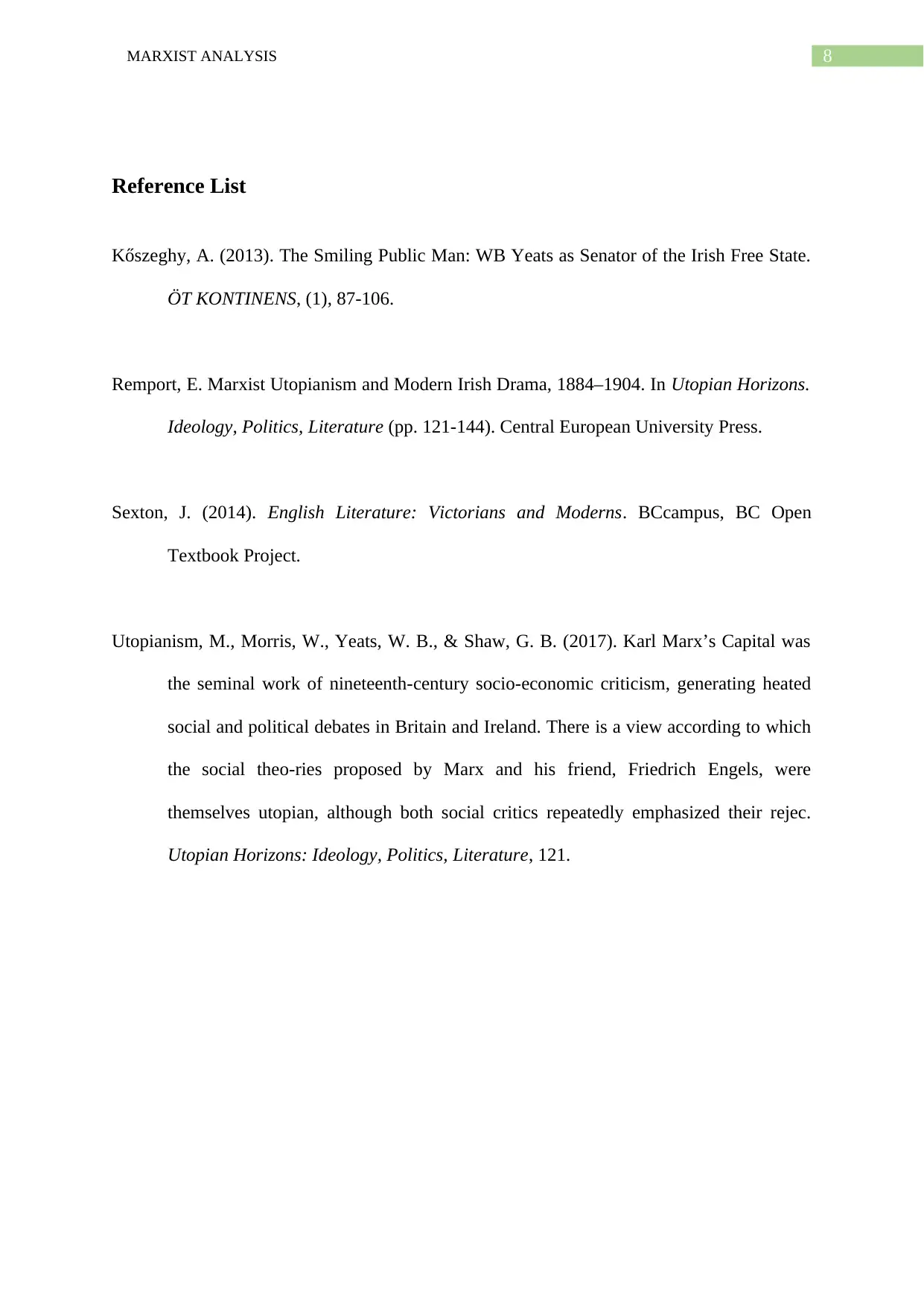
8MARXIST ANALYSIS
Reference List
Kőszeghy, A. (2013). The Smiling Public Man: WB Yeats as Senator of the Irish Free State.
ÖT KONTINENS, (1), 87-106.
Remport, E. Marxist Utopianism and Modern Irish Drama, 1884–1904. In Utopian Horizons.
Ideology, Politics, Literature (pp. 121-144). Central European University Press.
Sexton, J. (2014). English Literature: Victorians and Moderns. BCcampus, BC Open
Textbook Project.
Utopianism, M., Morris, W., Yeats, W. B., & Shaw, G. B. (2017). Karl Marx’s Capital was
the seminal work of nineteenth-century socio-economic criticism, generating heated
social and political debates in Britain and Ireland. There is a view according to which
the social theo-ries proposed by Marx and his friend, Friedrich Engels, were
themselves utopian, although both social critics repeatedly emphasized their rejec.
Utopian Horizons: Ideology, Politics, Literature, 121.
Reference List
Kőszeghy, A. (2013). The Smiling Public Man: WB Yeats as Senator of the Irish Free State.
ÖT KONTINENS, (1), 87-106.
Remport, E. Marxist Utopianism and Modern Irish Drama, 1884–1904. In Utopian Horizons.
Ideology, Politics, Literature (pp. 121-144). Central European University Press.
Sexton, J. (2014). English Literature: Victorians and Moderns. BCcampus, BC Open
Textbook Project.
Utopianism, M., Morris, W., Yeats, W. B., & Shaw, G. B. (2017). Karl Marx’s Capital was
the seminal work of nineteenth-century socio-economic criticism, generating heated
social and political debates in Britain and Ireland. There is a view according to which
the social theo-ries proposed by Marx and his friend, Friedrich Engels, were
themselves utopian, although both social critics repeatedly emphasized their rejec.
Utopian Horizons: Ideology, Politics, Literature, 121.
⊘ This is a preview!⊘
Do you want full access?
Subscribe today to unlock all pages.

Trusted by 1+ million students worldwide
1 out of 9
Your All-in-One AI-Powered Toolkit for Academic Success.
+13062052269
info@desklib.com
Available 24*7 on WhatsApp / Email
![[object Object]](/_next/static/media/star-bottom.7253800d.svg)
Unlock your academic potential
Copyright © 2020–2026 A2Z Services. All Rights Reserved. Developed and managed by ZUCOL.